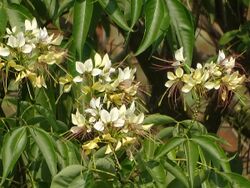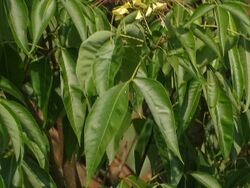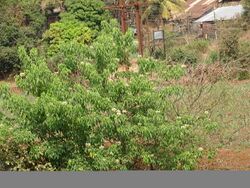Biology:Crateva nurvala
From HandWiki
Short description: Species of flowering plant
| Crateva nurvala | |
|---|---|
| Scientific classification | |
| Kingdom: | Plantae |
| Clade: | Tracheophytes |
| Clade: | Angiosperms |
| Clade: | Eudicots |
| Clade: | Rosids |
| Order: | Brassicales |
| Family: | Capparaceae |
| Genus: | Crateva |
| Species: | C. nurvala
|
| Binomial name | |
| Crateva nurvala Buch.-Ham.
| |
| Synonyms[1] | |
| |
Crateva nurvala is an accepted name for a small tree in the genus Crateva and the family Capparaceae.[1][2] However, the Catalogue of Life lists this as a synonym of C. magna.[3]
Distribution
The small wild or cultivated tree is widespread from India to Southeast Asia, south of China. It grows lowlands to an altitude of 1,000 m (3,300 ft) above sea level. It occurs on glades, at the edge of a forest, near rivers and lakes, etc.
Traditional medicine
The dried bark is used raw drug in traditional systems of medicine in India such as Ayurveda and Siddha.[4]
References
- ↑ 1.0 1.1 "The Plant List: A Working List of All Plant Species". http://www.theplantlist.org/tpl1.1/record/kew-2742376. Retrieved 1 April 2017.
- ↑ The International Plant Names Index
- ↑ Roskov Y.; Kunze T. (2014). "Species 2000 & ITIS Catalogue of Life: 2014 Annual Checklist.". in Didžiulis V.. Species 2000: Reading, UK.. http://www.catalogueoflife.org/annual-checklist/2014/details/species/id/16861202. Retrieved 26 May 2014.
- ↑ Bhattacharjee, Atanu; Shashidhara, Shastry Chakrakodi; Aswathanarayana (2012). "Phytochemical and ethno-pharmacological profile of Crataeva nurvala Buch-Hum (Varuna): A review". Asian Pacific Journal of Tropical Biomedicine 2 (2): S1162–8. doi:10.1016/S2221-1691(12)60379-7.
External links
Wikidata ☰ Q11140127 entry




